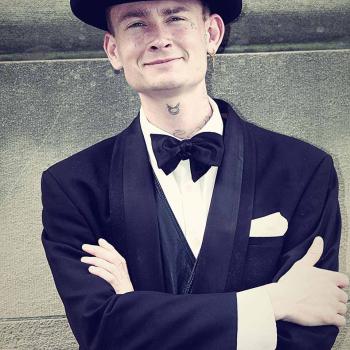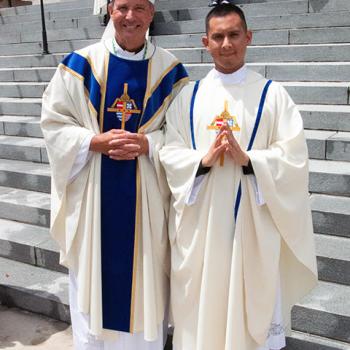In late July 1886, a ship pulled into Molokai, Hawaii's leper colony. Father Damien de Veuster always greeted the newcomers, usually lepers seeking refuge and comfort. But one passenger stood out, a tall man in a blue denim suit. He wasn't a leper; he was Joseph Dutton, and at age 43 he came to help Father Damien. The priest warned he couldn't pay anything, but Dutton didn't care. He would spend forty-five years on Molokai, remaining long after the priest's death of leprosy in 1889.
Joseph's journey to Molokai was full of twists and turns. Born Ira Barnes Dutton in Vermont on April 27, 1843, he grew up in a thoroughly Protestant setting. By age 18, he was teaching Sunday school in Wisconsin and working in a bookstore, when the Civil War broke out. It was an exciting time, he recalled: "streets lined with cheering crowds, bands playing, flags flying." He enlisted in September 1861, and for the next four years he served with the 13th Wisconsin Infantry Regiment.
Although the regiment saw little fighting during the war, Ira showed leadership and administrative skills, reaching the rank of Captain. As quartermaster, one fellow officer remembered him as having "a rare gift for business." He liked army life, and he considered it as a career, but military downsizing meant few commissions. Discharged in 1866, he spent the next two decades in a variety of jobs.
He married a woman he met during the war. It proved to be tragic, "one of those things I have tried to forget" (he never mentioned her name). Friends warned of her reputation for infidelity, but Ira had hoped to change her. A shopaholic who left him broke, she soon ran off with another man. Dutton seemed to hope she might return; he didn't file divorce papers until 1881.
After the war, he worked in cemeteries. He then oversaw a distillery in Alabama before working in Memphis on the railroads. In 1875, he joined the War Department settling claims against the government.
Successful in every field, he was nevertheless a functioning alcoholic. In the day, he was a solid citizen, but he spent his evenings with "John Barleycorn," although "I never injured anyone but myself."
Increasingly ashamed of this double life, in 1876 he vowed never to drink again, remaining sober until his death. He also experienced a spiritual transformation. While he fell away from religion during the war, he became interested in Catholicism through the influence of Catholic friends. After studying the catechism for a month, he was received into the Catholic Church on April 27, 1883, his 40th birthday. He changed his name to Joseph, his favorite saint, retired from the government, and began a "new life."
Wanting to do penance for his "wild years" and "sinful capers," Joseph set out for Our Lady of Gethsemani Monastery, Kentucky. Founded in 1848, he had earlier visited the place in connection with his government work. Now he resolved to do "penance for the rest of my years." After twenty months, he concluded that his life should be one of penitent action rather than contemplation. Still, he wrote, it was "what I needed at the time." (He remained lifelong friends with the Trappist monks, remembering them in his will.)
It was only after reading about Father Damien that he found his "real vocation":
The work attracted me wonderfully. After weighing it for a while I became convinced that it would suit my wants—for labor, for a penitential life, and for seclusion as well as complete separation from scenes of all past experiences. It seems a mere accident that I ever heard of this place, and it might never have happened again.
His motive was not to hide from the world, but "to do some good for my neighbor and at the same time make it my penitentiary in doing penance for my sins and errors." From San Francisco, he sailed for Molokai in the summer of 1886.
With two pensions, Joseph had saved a good deal of money. (At Molokai, he would donate some $10,000.) He served as administrator, carpenter, and repairman; he bandaged wounds; he coached baseball; he comforted the sick and the dying. "Every day," one biographer writes, "he marveled more and more at the courage he saw around him—bravery, he often said, much greater than in the war he had been through." He made a difference. Before his death in 1889, Father Damien said: "I can die now. Brother Joseph will take care of my orphans."
Although he never took religious vows, Dutton was known as "Brother Joseph," a "brother to everybody." On Molokai he found real peace and joy. One peer recalled: "Dutton had a divine temper; nothing could ruffle it." At 83, Joseph wrote: "I am ashamed to think that I am inclined to be jolly. Often think we don't know that our Lord ever laughed, and here my laugh is ready to burst out any minute."
He never left Molokai; he never wanted to. "Seek a vacation?" he asked. "Anything else would be slavery . . . The people here like me, I think, and I am sure I like them." He added: "I would not leave my lepers for all the money the world might have." The one exception was in 1917, when the 74-year-old patriot tried "to buckle on my sword-belt again" and re-enlist. His application was rejected, but he wasn't heart-broken.
Before his death on March 26, 1931, he said: "It has been a happy place—a happy life." It had been a restless life until he found happiness among the lepers of Molokai. At the time of his death, the Jesuit magazine America noted: "Virtue is never so attractive as when we see it in action. It has a power to believe that we too can rise up above this fallen nature of ours to a fellowship with the saints."
Read more from the Patheos Year of Faith series here.
12/2/2022 9:05:40 PM





